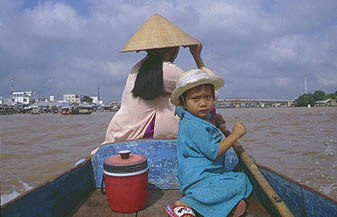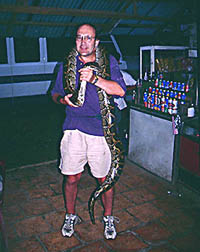|
 |
| Bill next traveled south to the Mekong Delta and down the Mekong River.
"Beguiling and enchanting" was how Bill described it. Bill remembers
the monsoon rains, stopping in small villages and damaging his camera. However, at this point I want to discuss Bill's feelings regarding Southeast Asia and its people especially the Vietnamese. Remember, Bill is from the United States, a country which engaged Vietnam in a war which killed over 3 million of its citizens. We still have large amounts of veterans from the Vietnam War and veterans from the anti-war movement with battle scars. However, the war was waged in Vietnam and the vast majority of the misery and suffering were endured by the Vietnamese and their southeast Asian neighbors. |
|
Before going to Vietnam, Bill had spent over a year in Thailand.His decision to go to Asia was fairly accidental. He was in Athens, Greece and sick in bed with bronchitis and casually asked his roommates what should be his next destination IF he were to make his European trip a round-the-world trip. Their answer was, of course, Thailand, describing it as "the sweetest country on the earth". Despite its despotic and cruel government, many westerners were well received and took advantage of its amazing hospitality and easily accessible pleasures. Thus began Bill's southeast Asia odyssey and his love affair with its people. "It's my . |
| favorite place in the world and as you know, I have traveled all over the
world. There's something so special about those countries..." His year in Thailand enabled Bill to interact with its people and planted the seeds in his mind for his "return" trip to Vietnam. After spending all this time in Thailand and living with its people Bill would often ponder in amazement, " How could we have abused these people so much? They are so wonderful. They are so outstanding." In Vietnam, despite his being a citizen of a former enemy country, Bill's experiences with its people were "probably antithetical to what anyone would have anticipated. It was absolutely with grace and friendliness and forgiveness and kindness [that Bill was received]. It was remarkable." We have already related Bill's kind reception by the War Museum Curator in Ho Chi Minh City. |
|
Bill's interactions were not just with former communist fighters or those that had supported them during the war. He would frequently run into veterans of the war who had fought in the ARVN or the Army of the Republic of Vietnam (South Vietnam.) Usually, Bill related to me, "When they found out I was an American , I think they assumed that I was a war monger, an ex-Green Beret ..." and they acted "very pro-American." In fact, one ARVN veteran told Bill, probably so as to spare his feelings, that "America didn't lose the war, just withdrew."
Bill even met two former American veterans in Vietnam. Both had fought in Vietnam and had returned after the war and married Vietnamese women, both communists. They were now living in Ho Chi Minh City and engaged in making wheelchairs for the Vietnamese. Bill still corresponds with one of them and has donated towards their efforts. "We always portray the [American] veterans as despising the Kent State activists," Bill said during our interview. "But this guy said if he was stateside, he would have been at Kent State."
All in all, Bill felt that Vietnam was a "very open society." He was often prompted to give his opinion on the west, Bill Clinton and even socialism vs. capitalism. "They were very engaging people, very thoughtful, and were extremely open. There didn't seem to be any sense of repression to me."

